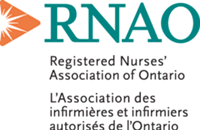Nurses urge health ministers to build Medicare's next phase
TORONTO, Oct. 14, 2016 /CNW/ - When provincial and territorial health ministers sit down with their federal counterpart next week to draft a new national health accord, they will benefit from recommendations sent by nurses who know firsthand what is ailing the country's health system, its strengths, and what it will take to ensure it best serves Canadians.
The recommendations are outlined in a letter sent to Jane Philpott, federal health minister, and Eric Hoskins, Ontario's minister of health, by the Registered Nurses' Association of Ontario (RNAO).
The country's first – and historical – health accord was signed in 2004 by former Prime Minister Paul Martin. It expired in 2014 under then Prime Minister Stephen Harper who refused to negotiate a new agreement. When elected last year, Prime Minister Justin Trudeau promised his government would sit down with the provinces and territories to draft a new accord.
"Next week's meeting represents a golden opportunity to fully restore the partnership between provinces, territories and our federal government by agreeing on the funding and services that will strengthen Canada's health system," says Carol Timmings, RNAO president.
RNAO says this second health accord should again span 10 years, with annual increases to health transfers from the federal government of six per cent, as was the case with the first accord. It must also include guarantees that health payments can't be used for for-profit care delivery. "No jurisdiction should be allowed to use money earmarked for health to engage in for-profit care delivery," emphasizes Timmings.
Funding isn't the only item needed to make this agreement effective. A universal pharmacare plan must be included, as urged by RNAO in a letter to Ministers Philpott and Hoskins. "Minister Hoskins has been a key champion of national pharmacare, and we stand side by side with him, especially as our health system provides more and more care in the community," says Timmings. "Such a program would provide Canadians who can't afford their prescriptions with access to the medications they need and would save the system billions of dollars in the process."
"There already seems to be agreement among jurisdictions on the need to build a robust home care sector so Canadians can age in the comfort of their homes with the needed support services. RNAO has been a strong advocate for strengthening community care and would applaud seeing this included in the new accord," says Doris Grinspun, RNAO's chief executive officer.
RNAO also urges health ministers to build on the targeted funding for interprofessional primary care that was included in the 2004 agreement and again dedicate a portion of health transfer funds for this purpose. "Robust primary care is the hallmark of high-performing health systems around the world. It will keep people healthier and away from costly hospital care," says Grinspun, noting that Ontario's network of Aboriginal Health Access Centres, Community Health Centres, Family Health Teams, and Nurse Practitioner Led-Clinics are good examples of effective primary care.
Ottawa's commitment to Canada's Indigenous peoples needs to be matched with concrete action on the health front, Grinspun pleads. "The government needs to address the unconscionable mental, physical, social and economic inequities members of our Indigenous communities face right across this country. A first step is including representatives from these communities in next week's talks."
Grinspun says the timing is perfect for politicians to hammer out a new health agreement. "Provincial, territorial and federal ministers have already met to discuss what should be included in a new agreement. At the conclusion of their upcoming meeting, we want to see a photo-op with a new health accord in hand," she says, adding members of the public deserve nothing less.
RNAO is the professional association representing registered nurses, nurse practitioners, and nursing students in Ontario. Since 1925, RNAO has advocated for healthy public policy, promoted excellence in nursing practice, increased nurses' contribution to shaping the health-care system, and influenced decisions that affect nurses and the public they serve. For more information about RNAO, visit RNAO.ca or follow us on Facebook and Twitter.
SOURCE Registered Nurses' Association of Ontario

or to arrange an interview with a nurse, please contact: Marion Zych, Director of Communications, Registered Nurses' Association of Ontario (RNAO), 416-408-5605 (office), 647-406-5605 (cell), [email protected]

Share this article